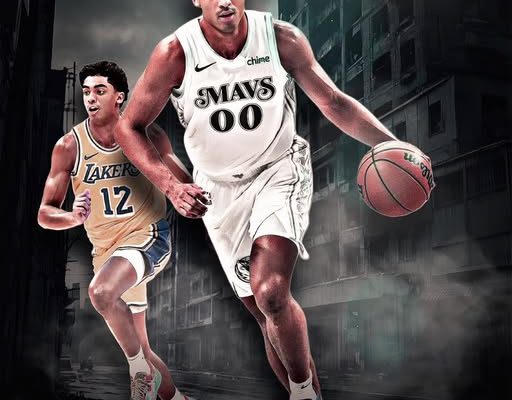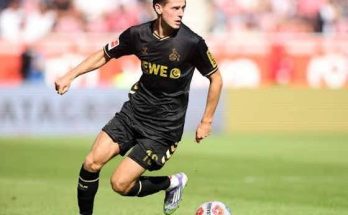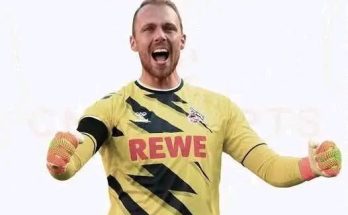Max Christie’s rise in the NBA has been the story of quiet determination, understated growth, and a patient belief that his moment would come. But even in a league of highlights and headlines, Christie shocked fans recently when he revealed what he considers the most memorable day of his career. It wasn’t the day he was drafted, his career-high scoring night, or even the first time he shared the court with LeBron James. Instead, Christie said, “It was when I got traded to the Mavericks.” The remark sent a wave of curiosity through NBA circles, prompting a deeper look into why that day, more than any other, represented a true turning point in his professional journey.
Max Christie entered the league in 2022 as a second-round pick of the Los Angeles Lakers, a franchise constantly swirling in scrutiny and pressure. As a young player surrounded by veterans and superstars, Christie had to claw his way into the rotation. His minutes were sporadic, his role undefined, and his development journey less visible than that of other young standouts around the league. Still, he played hard, listened, absorbed the atmosphere of greatness around him, and remained patient. The Lakers were a win-now team, with every move calibrated around maximizing the final years of LeBron James’ career. Christie, though a promising wing defender and developing shooter, simply didn’t get the consistent opportunity to show who he could be when given the keys.
His time in Los Angeles was not without bright moments. Christie often drew praise in practice and was a regular in developmental conversations inside the Lakers’ coaching staff. But games often came and went with him playing single-digit minutes or remaining glued to the bench altogether. That situation, while not unique to him, can wear down the confidence of a young player. Still, he never let his attitude sour. He stayed ready.
That’s why when Christie was informed he had been traded to the Dallas Mavericks, a wave of emotion washed over him. For some, a trade feels like rejection—a team choosing to move on, signaling perhaps they didn’t believe enough to keep you. But for Christie, it was something entirely different. It wasn’t just a change of scenery; it was a validation. Another team, one that had just reached the NBA Finals behind Luka Dončić and Kyrie Irving, saw in him a piece worth adding to a contender. That meant something. That mattered.
Christie’s comment about that day being his favorite in the NBA wasn’t made with bitterness. In fact, he was quick to praise his experience in Los Angeles, speaking highly of the mentorship he received and how much he learned by simply being around veterans who had championship DNA. But when he spoke about the trade to Dallas, there was a spark in his voice, the kind that only comes from a realization: they believe in me. That belief is what any athlete craves. It’s not just about being on a roster—it’s about mattering.
In Dallas, Christie immediately found himself in a different situation. The Mavericks had made it clear that they targeted him in the deal—not as a throw-in, not as a developmental project, but as a potential rotational player with length, shooting touch, and defensive instincts. In an era where wings who can switch and stretch the floor are gold, Christie had become an asset worth pursuing. And in Dallas, he felt that. He felt seen.
What made the day even more special was the way it unfolded. Christie recalled being in the middle of a workout when his agent called. The Lakers had just finalized a deal that would send him to Dallas in exchange for future draft assets and a veteran shooter. It wasn’t a blockbuster by national standards, but for Christie, it was seismic. He said he didn’t stop smiling for hours. The first person he called was his mom. “She cried,” he said. “But happy tears. She knew how hard I’d been working, how much I wanted the chance to really play, to really help a team win.”
The Mavericks organization, for their part, welcomed him with open arms. Head coach Jason Kidd spoke to Christie directly on the day of the trade, emphasizing that he liked his toughness and that there would be a chance to compete for meaningful minutes. Unlike his time in L.A., where the path to playing time was murky and often political, Dallas offered a clearer runway. They needed wing depth. They needed defensive versatility. And they wanted hunger.
Christie came into training camp with something to prove—not out of spite, but out of gratitude. The tone he took was humble, but fierce. He wasn’t talking big, he was working big. Every drill, every scrimmage, every film session, he approached with purpose. It wasn’t lost on him that this was a pivotal moment, a fresh chapter, and possibly the one that would define his NBA story.
As the season began, Christie carved out a role faster than even optimistic Mavericks fans expected. His minutes climbed, his confidence surged, and he began knocking down corner threes and locking up opposing guards. What surprised some observers was how vocal he became on the court. Previously quiet, almost reserved in his demeanor, Christie began to lead by energy. He’d slap the floor after a big defensive stop. He’d gesture to his teammates to keep the intensity up. He wasn’t just fitting in—he was thriving.
The synergy between him and Dončić grew quickly. Luka, known for his wizardry with the ball and high basketball IQ, appreciated Christie’s off-ball movement and timely cuts. Kyrie Irving, too, praised Christie for being a “composed young pro” who didn’t play like a kid trying to survive. That kind of affirmation from future Hall of Famers only fueled Christie more.
And then came the moment that solidified his claim that the trade was the best day of his career. In a nationally televised game against the Phoenix Suns, Christie logged a season-high 29 minutes, scored 16 points, and recorded a pair of blocks and steals while defending both Devin Booker and Bradley Beal at various points. The Mavericks won in overtime, and Christie’s fingerprints were all over the win. “That’s the Max we traded for,” said Mavericks GM Nico Harrison after the game. “He’s just getting started.”
Christie’s rise in Dallas is a case study in how a change in environment can unlock a player’s potential. Sometimes, it’s not about talent gaps, but opportunity gaps. The NBA is filled with players who, under different circumstances, might have entirely different careers. Christie knows that. He doesn’t take his new situation for granted. He speaks often about the blessing of being wanted, of being put in a position to succeed.
There’s also an emotional element to his journey. Christie said that the night after the trade, he sat in his room and wrote in his journal, something he’s done since high school. “I wrote down that I was done waiting. That I wasn’t just going to fit in anymore—I was going to impact games,” he recalled. That mindset shift wasn’t just talk. It became the fuel for everything that followed.
His teammates noticed. The Mavericks locker room is a mix of established stars and ascending talent, and Christie has fit into the culture seamlessly. Veteran players have embraced him, while younger ones have leaned on his work ethic as a model. What makes his story even more compelling is the fact that he isn’t doing it for attention. There’s a grounded nature to Christie’s presence—he plays hard, speaks softly, and lets the game talk.
So when Max Christie says that being traded to Dallas was the best day of his career, it’s not just about basketball. It’s about liberation. It’s about self-worth. It’s about feeling like more than just a name on a depth chart. For Christie, that day represented the culmination of years of hard work, quiet belief, and resilience. It was the day his career got a second wind and his voice finally got volume.



